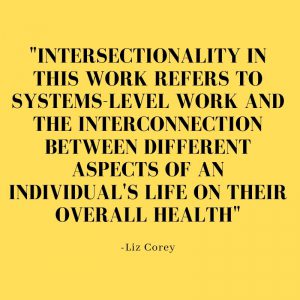#UMNMCH student Liz Corey wrote this reflection on how her coursework, internships, field experience, and culminating experience have all contributed to her career in Maternal and Child Health.
 I didn’t learn that Public Health was a career field until my 5th and final year of studying sociology and anthropology as an undergrad, after taking years and many electives to finally decide on these majors. During an internship with a city-county health department in Bozeman, Montana, my first public health mentor was an RN named Cindi who had gotten her MPH from Johns Hopkins and was the manager of the communicable disease department. Cindi spent many hours explaining the basics of a public health approach to healthcare systems and helping me design, conduct, and present a research project on immunization rates and herd immunity in local schools. During my deployment with the Division of Child and Family Health with the Minnesota Department of Health, Blair Harrison and Molly Meyer, both Senior Research Scientists, served as my deployment supervisors and maternal and child health mentors. I began my deployment in October of 2018 and will continue the deployment through May of 2020. So far, my largest project has been assisting with the writing, review, and editing of 40 briefs across 6 MCH domains, 5 of which are population- based: maternal health, infant health, child health, adolescent health, and children and youth with special needs (CYSHN). The topics for briefs were identified through a statewide survey and were reviewed by subject matter experts. The briefs were used in prioritization activities with stakeholders to whittle down the list of 40 candidates to 10 selected priorities that will be the strategic focus areas in Minnesota MCH for the next 5 years of the Title V funding cycle. A goal of this needs assessment was to be as trauma- informed, inclusive, and equitable as possible, so care was taken throughout the design and implementation to hear the voices of those that have not typically been included in the maternal and child health decision making process: people of color, immigrants, refugees, fathers, and people living in rural areas. Writing these briefs proved challenging, as succinctly sharing impactful data points, creating interesting visuals, and making connections to experiences of trauma made the work intensive and at times bleak. I had to navigate literature reviews, intricacies of different surveys and data sources, and input from subject matter experts to eventually produce a short brief with a cohesive voice. All of the priority needs involved social determinants of health, but some priority needs involved more complex intersections of these determinants of health.
I didn’t learn that Public Health was a career field until my 5th and final year of studying sociology and anthropology as an undergrad, after taking years and many electives to finally decide on these majors. During an internship with a city-county health department in Bozeman, Montana, my first public health mentor was an RN named Cindi who had gotten her MPH from Johns Hopkins and was the manager of the communicable disease department. Cindi spent many hours explaining the basics of a public health approach to healthcare systems and helping me design, conduct, and present a research project on immunization rates and herd immunity in local schools. During my deployment with the Division of Child and Family Health with the Minnesota Department of Health, Blair Harrison and Molly Meyer, both Senior Research Scientists, served as my deployment supervisors and maternal and child health mentors. I began my deployment in October of 2018 and will continue the deployment through May of 2020. So far, my largest project has been assisting with the writing, review, and editing of 40 briefs across 6 MCH domains, 5 of which are population- based: maternal health, infant health, child health, adolescent health, and children and youth with special needs (CYSHN). The topics for briefs were identified through a statewide survey and were reviewed by subject matter experts. The briefs were used in prioritization activities with stakeholders to whittle down the list of 40 candidates to 10 selected priorities that will be the strategic focus areas in Minnesota MCH for the next 5 years of the Title V funding cycle. A goal of this needs assessment was to be as trauma- informed, inclusive, and equitable as possible, so care was taken throughout the design and implementation to hear the voices of those that have not typically been included in the maternal and child health decision making process: people of color, immigrants, refugees, fathers, and people living in rural areas. Writing these briefs proved challenging, as succinctly sharing impactful data points, creating interesting visuals, and making connections to experiences of trauma made the work intensive and at times bleak. I had to navigate literature reviews, intricacies of different surveys and data sources, and input from subject matter experts to eventually produce a short brief with a cohesive voice. All of the priority needs involved social determinants of health, but some priority needs involved more complex intersections of these determinants of health.
Intersectionality has been a keyword throughout my deployment and has built on my understanding of the myriad ways that health is determined by identity, society, culture, and environment. Intersectionality in this work refers to systems-level work and the interconnection between different aspects of an individual’s life on their overall health. The socioecological model is built on this idea of intersectionality, which is addressed within the Title V program through the 6th and final MCH domain: Cross-cutting. Cross-cutting topics are those that are highly complex and are influenced by gender, race, age, class, socioeconomic status, religion, family, neighborhood, government, and historical trauma.
Tackling these larger questions through writing briefs with my mentors has helped me to fully appreciate the many different sciences that must be considered to work in public health and promote health equity. As the needs assessment moves into the strategy development stage, I am interested to explore how strategies and  measures are developed from a life-course approach that can impact and accurately assess health outcomes over the lifespan. Working with Blair and Molly to support their work leading the Title V Needs Assessment has propelled my professional development through learning new skills and networking with others that work at or are involved with the Minnesota Department of Health. I can’t wait to share additional experiences I have through this deployment during the upcoming year!
measures are developed from a life-course approach that can impact and accurately assess health outcomes over the lifespan. Working with Blair and Molly to support their work leading the Title V Needs Assessment has propelled my professional development through learning new skills and networking with others that work at or are involved with the Minnesota Department of Health. I can’t wait to share additional experiences I have through this deployment during the upcoming year!
Liz is a second-year maternal and child health MPH student at the University of Minnesota. She completed undergraduate degrees in sociology and anthropology at Montana State University, then went on to work with nonprofits addressing food insecurity, mental illness, substance use, homelessness, and adolescent pregnancy primarily as a case manager. She enjoys making connections between public health and other industries to address health issues from a holistic approach, which prompted her to pursue an MPH working with the maternal and child health population. She is also minoring in epidemiology to support her research interest in data-driven public health interventions.
–Read Student Spotlight archives
Interested in learning more about getting a degree in MCH? Visit our MCH Program page for more information.
#UMNMCH #UMNproud #UMNdriven